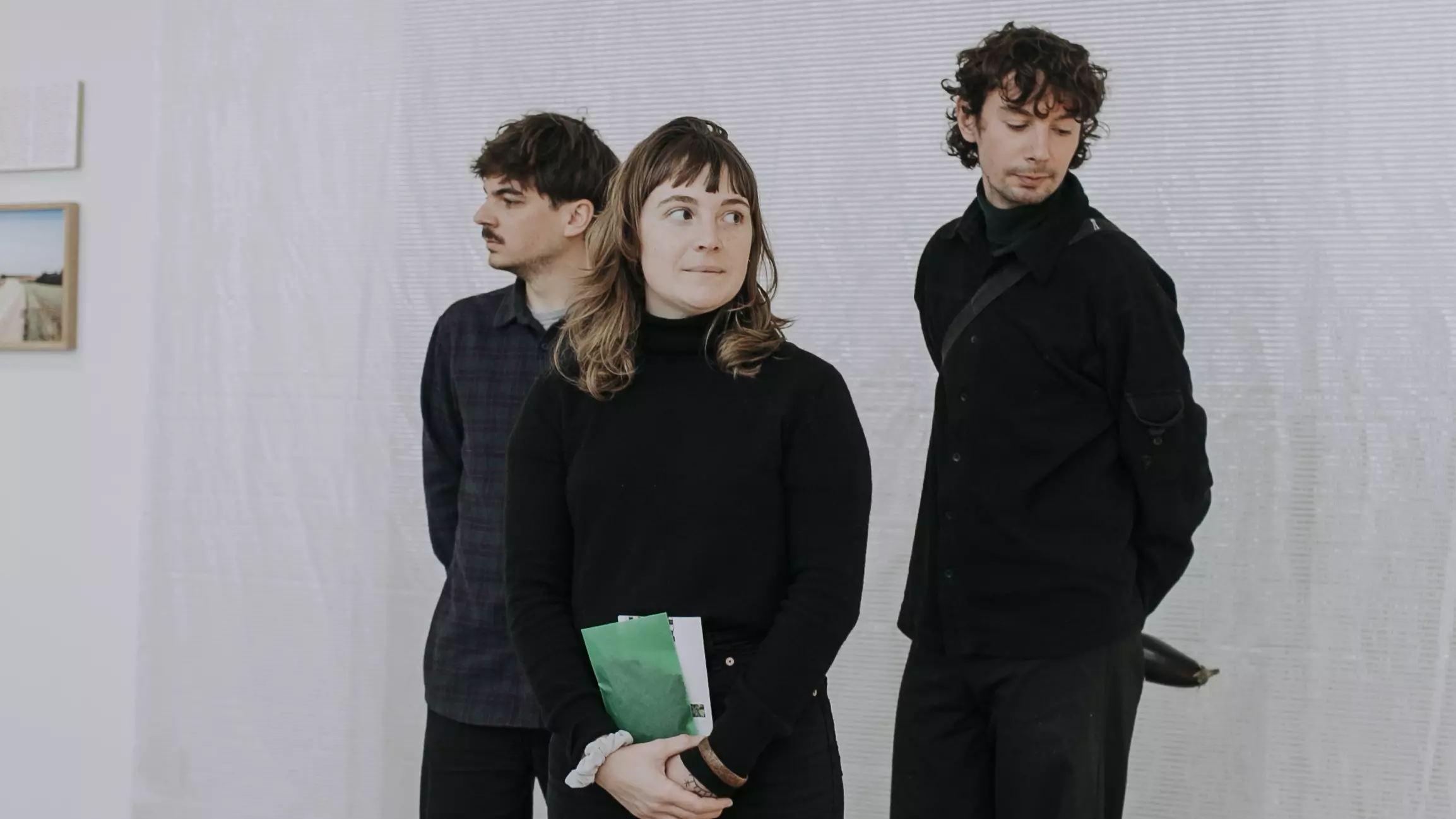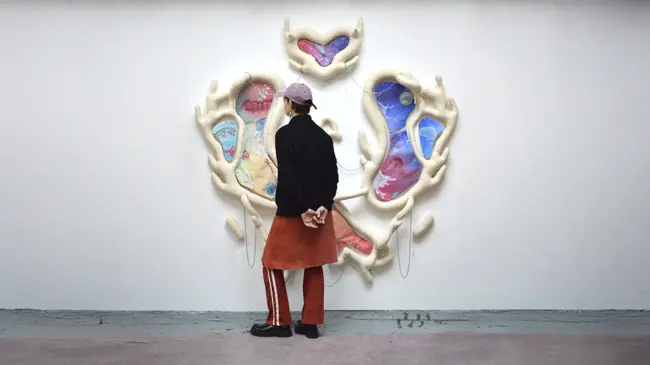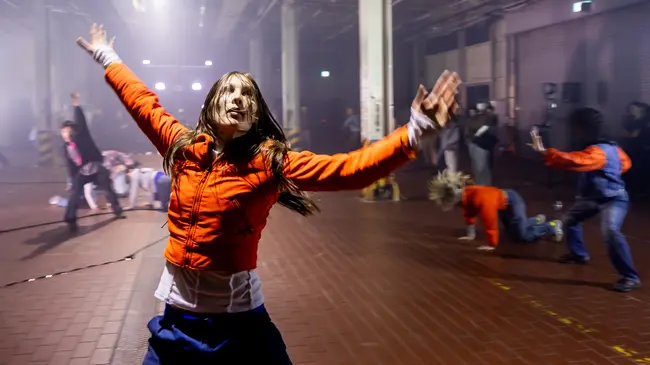Light the fire!

Every summer, millions of seasonal workers from Southern and Eastern Europe travel to farms in the west. Those helping hands were taken for granted for a long time until Covid brought the temporary migration to a halt - and what is not there is suddenly missed. For the exhibition, Our Invisible Hands in Z33, 16 artists became seasonal labourers themselves. Architects Salomon Tyler and Camille Gaillard from collectif dallas tell us about their fieldwork and the ‘sacred firepot’ they imagined.
The exhibition was made by 16 artists who form Seasonal Neighbours together. How did you become part of that network?
Salomon: The collective was initiated by Ciel Grommen and Maximiliaan Royakkers, who we met a couple of years ago when helping them to build an outdoor swimming infrastructure.
Camille: Ciel and Maximiliaan had already been researching seasonal labour in the countryside, but in 2020 Covid hit and the Eastern European workers couldn’t come to Belgium in the summer. Therefore Ciel and Maximiliaan launched an open call for artists to help on the farms and at the same time grow their research project. Salomon and I decided to join them, while the other members of collectif dallas (Simon Lemutricy and Amaury Veillard) were working on another project.


Seasonal Neighbours consists of visual artists, writers, filmmakers, designers…, and you are architects. Do you consider yourself an artist?
C: We studied architecture at school, but our practice lies somewhere in between art, architecture and crafts.
It doesn’t make much difference if we define our work as architecture or as art
S: Actually, it doesn’t make much difference if we define our work as architecture or as art. We make installations that intervene in public space; you can call that architecture but you can also call it art. Still, this is one of the most artistic projects we’ve ever participated in. Traditionally, architecture starts from external demand, but here we were answering the questions that we asked ourselves. That gave us a lot of freedom, but it was also challenging to design something for a concept rather than for another client.


For the project, you first had to do some fieldwork and become agricultural workers yourselves. What did you do?
C: We went to the north of France, where we picked apples and pears for three weeks. That was quite hard work! [Laughs]
S: Moreover, we didn’t say that we were doing artistic research. The idea was that we would go to the farms incognito, as normal workers. We wanted to interact spontaneously, without a label.
We picked apples and pears for three weeks. That was quite hard work!
C: However, in a later stage of our research, we visited farmers in Haspengouw where we did talk about the exhibition. We went there because in France we developed a fascination for antifreeze infrastructures and wanted to illustrate the different existing systems in Flanders. That was fun too; the farmers were amused that we wanted to make art of their everyday practice. For them, it’s nothing special.


I read that for collectif dallas, the building site is the most important stage of a project. Did this fieldwork play the same important role?
S: Yes. It was really interesting to see how life in rural areas works and what kind of spaces the seasonal workers gather in.
C: It was also necessary to pick a subject for our project. Before that, we had rarely heard about antifreeze systems, which are used to prevent crops from freezing.
S: We discovered the stoves and other systems. There are even infrastructures that look like wind turbines but which are in fact fans that move heat from the ground towards the crops.


You created your own ‘fire pot’ or stove for the expo. Why are you so fascinated by this?
S: The stoves have a mystical element of fire but also of temporality. They’re put in the orchards and vineyards around the end of March when the crops have already bloomed but still may freeze. That’s a very short period - sometimes they’re used only once or twice a year. But the few nights that they are used, it’s a big collaborative event.
It’s a bit like a rain dance
C: Some farmers told us that the seasonal workers enjoy this work because it’s something different from their daily task of picking fruit. They have to be up all night to light the stoves all over the vineyards.
S: It’s even a bit like a rain dance: the farmers don’t know if these systems will help, but they cannot do anything and wait for the plants to freeze.


With Collectif Dallas, you also often make temporary installations in public spaces, like a stage, a bar, a bench... Do you find it a pity that these have to disappear after a while?
S: No, it’s reassuring that they won’t stay forever and it gives us more freedom to experiment. We can do things in public space, which may not have been allowed if they would have been permanent.


On the weekend of 20 March, the ritual with the stove will take place in Z33. What will happen?
C: It will be a two-part event. On 19 March, we’ll invite farmers to visit the exhibition. Afterwards, we’ll carry the stove outside on our shoulders and we’ll walk in a procession on the Roman road through the orchards of Haspengouw until we reach fruit company Pipo in Sint-Truiden. There, the stove will be lit the next day with bundles of branches from pruned fruit trees.
S: We believe our society is losing rituals and we want to continue these events, which are about caring, sharing, gathering. So everyone is more than welcome!
We believe our society is losing rituals and we want to continue these events about caring, sharing & gathering
Different Class works with the interest of their community at heart.
Our work’s purpose is to foster a solid network for independent artists, those who love them, and those who want to support them. Become a member to contribute to the local Belgian art scene.






